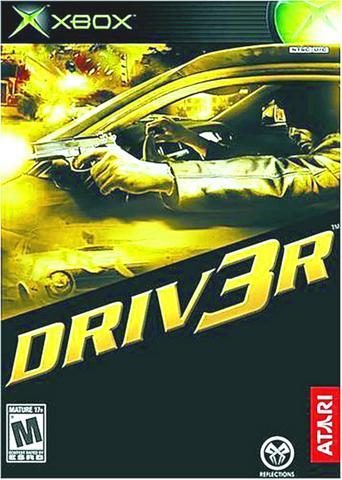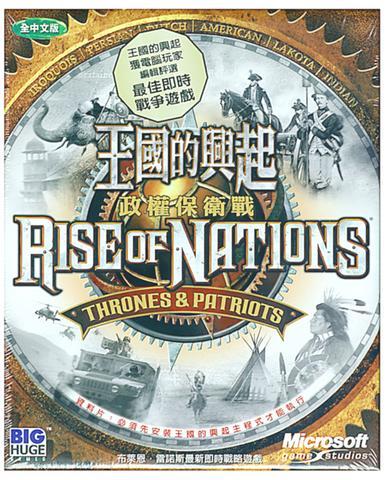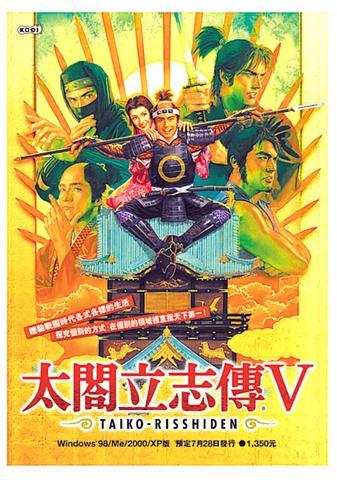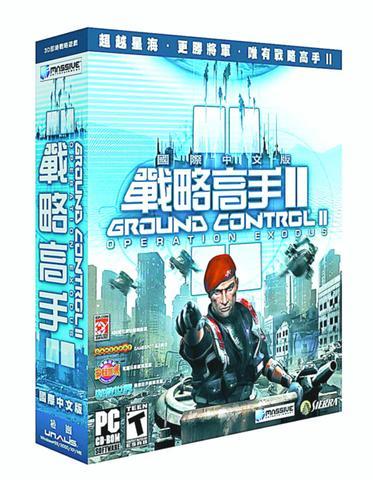Ground Control II (戰略高手 II)
International distributor: VU Gamesa
Local Distributor: Unalis Technology

Platform: Chinese and English for PC
Taiwan release: July 29
When it was first released in 2000, Ground Control was seen as a milestone in Real-time Strategy (RTS) gaming, with its efficient battleground modes and amazing 3D graphics. With Ground Control II due for release at the end of the month, the people at VU games are pushing the envelope of RTS. And with Ground Control II being released in a Chinese-language version as well, this is likely to be one of the hottest games in Taiwan this summer.

Ground Control II: Operation Exodus takes place during the year 2741AD, roughly 300 years after the events in the original game. The democratic Northern Star Alliance (NSA) is being hard pressed by the warmongering Terran Empire. The war has recently entered a new stage; a brutal and deadly ground war, as the Empire has managed to land their first troopships on the last NSA controlled planet Morningstar Prime. Captain Jacob Angelus, a battle-hardened officer in the NSA armed forces, finds himself becoming the central figure in the war against the Terran Empire. The situation is desperate and for the NSA destiny is at hand; its only hope lies in an ancient legend.
Deployment for the two sides are totally different and the option for single person, small unit and mass combat are all available, with the game's AI software handling all three modes with equally quality. There is also the choice of five kinds of terrain, which considerably influence the way units can be deployed, providing gamers with many combinations and extended playability. The "drop in" online function allows new players to join the game at any time, and there is also extended support for Chinese language Unicode and IME characters for online chat.
Taiko Risshiden

International distributor: Koei
Local distributor: Koei Taiwan
Platform: Chinese for PC

Taiwan release: July 28
The Taiko Risshiden series of historical games covering the unification of Japan under Toyotomi Hideyoshi (1536 to 1598) has proved one of Koei's most popular products. Players pick one of many historical characters, or simply create their own character, developing their skills, then using diplomatic and military means to achieve the ultimate goal of uniting Japan.
In Taiko Risshiden, players must train their characters in skills such as the tea ceremony, combat, classical learning and commerce. They can also master six special weapons. The player selects from a wide range of professions at the beginning of the game, ranging from the usual warrior or trader character to include doctors, pirates, all of whom have their special abilities.

The first part of Taiko Risshiden is taken up with building your character, making contacts and acquiring materials. Then the battle for Japan begins in earnest, and the gamer can choose to conduct this through guerrilla warfare, siege warfare or individual combat. An important aspect of this game is the use of alliances to achieve your ends.
Rise of Nations: Thrones and Patriots
International distributor: Microsoft
Local distributor: Microsoft Taiwan
Platform: Chinese for PC
Taiwan release: Already available
Rise of Nations, released last year, was praised by local gaming magazines as one of the best RTS games of the year. Although it was no match for the 3D effects that were already available in a number of other RTS games on the market, its combination of individual combat and the broad canvas of Civilization-like empire building proved irresistible.
This expansion pack, Thrones and Patriots adds new civilizations to the original mix of Alexander, Napoleon, the New World and Cold War scenarios offered in Rise of Nations, including African, Indian and Meso-American scenarios. Twenty new types of units, the option of new government types and many new "wonders" give the original game a new lease of life.
The expansion disc also provides a "government" mechanism to give players military or non-military bonus.
Basically, there are two kinds of approach, one is the democratic system, and the other is the authoritarian. After a player builds a "senate" in any city, this city becomes the empire's capital and allows players to choose their approach. The players must develop their government system depending on the character of their nation as well as their rival's to successfully get extraordinary benefits during the combats.
Driv3r
Local and international distributor: Atari
Platform: PC, PS2 and X-Box (X-Box only in Taiwan)
Taiwan release: Already available
Undercover FBI agent, Tanner is back in the third instalment of the popular console crime simulation, Driv3r. Like its predecessors, the latest Driver gives players the opportunity to drive an assortment of vehicles, undertake dangerous missions and get involved in shoot-outs and high-speed pursuits with the police and trigger happy car thieves.
The game has three very different modes the most challenging of which is the "undercover" mode. Here players take Tanner on 26 missions that encompass the highways and byways of Miami, Nice and Istanbul in bid to infiltrate an auto theft ring and take down a crime syndicate.
For the most part the "Undercover" mode is graphical pleasing and the thriller-like story line quite enjoyable, but sadly some of the missions offer little substance and are far too easy. The "driving" mode is best left well alone as its survival contest, checkpoint race and cat and mouse game are all very mundane.
While there are no objectives or missions to the game's "take a ride" mode it is by far the most entertaining of the three. Those with sociopathic tendencies will like this mode, as players can take leisurely strolls through the three cities, steal cars, go on shooting rampages and either out smart the police or be gunned down in a hail of bullets.
The concept behind Driv3r is solid, but some rather dim controls and AI let the game down. Aiming firearms is problematic and controlling some of the vehicles can be frustrating at times, especially when you're in a hurry to get out of a tight spot or are cornered by M16-toting gangsters.
Splinter Cell: Pandora Tomorrow
Local distributor: Unalis
Platform: PC, PS2, X-Box (PC only in Taiwan)
Taiwan release: Already available
Sam Fisher returns to reek anti-terror havoc in the long awaited sequel to Tom Clancy's Splinter Cell, Splinter Cell: Pandora Tomorrow. This time around our hero, who is once again working for the US Government, is tasked with tracking down a dastardly terrorist who is threatening to release a biological agent and kill millions.
The basic gameplay remains unchanged with players sneaking around either avoiding or bumping off the enemy. The manufacturers have added enough new twists, turns and environments, however, to keep players of Pandora Tomorrow both entertained and on their toes.

On April 26, The Lancet published a letter from two doctors at Taichung-based China Medical University Hospital (CMUH) warning that “Taiwan’s Health Care System is on the Brink of Collapse.” The authors said that “Years of policy inaction and mismanagement of resources have led to the National Health Insurance system operating under unsustainable conditions.” The pushback was immediate. Errors in the paper were quickly identified and publicized, to discredit the authors (the hospital apologized). CNA reported that CMUH said the letter described Taiwan in 2021 as having 62 nurses per 10,000 people, when the correct number was 78 nurses per 10,000

May 5 to May 11 What started out as friction between Taiwanese students at Taichung First High School and a Japanese head cook escalated dramatically over the first two weeks of May 1927. It began on April 30 when the cook’s wife knew that lotus starch used in that night’s dinner had rat feces in it, but failed to inform staff until the meal was already prepared. The students believed that her silence was intentional, and filed a complaint. The school’s Japanese administrators sided with the cook’s family, dismissing the students as troublemakers and clamping down on their freedoms — with

As Donald Trump’s executive order in March led to the shuttering of Voice of America (VOA) — the global broadcaster whose roots date back to the fight against Nazi propaganda — he quickly attracted support from figures not used to aligning themselves with any US administration. Trump had ordered the US Agency for Global Media, the federal agency that funds VOA and other groups promoting independent journalism overseas, to be “eliminated to the maximum extent consistent with applicable law.” The decision suddenly halted programming in 49 languages to more than 425 million people. In Moscow, Margarita Simonyan, the hardline editor-in-chief of the

Six weeks before I embarked on a research mission in Kyoto, I was sitting alone at a bar counter in Melbourne. Next to me, a woman was bragging loudly to a friend: She, too, was heading to Kyoto, I quickly discerned. Except her trip was in four months. And she’d just pulled an all-nighter booking restaurant reservations. As I snooped on the conversation, I broke out in a sweat, panicking because I’d yet to secure a single table. Then I remembered: Eating well in Japan is absolutely not something to lose sleep over. It’s true that the best-known institutions book up faster